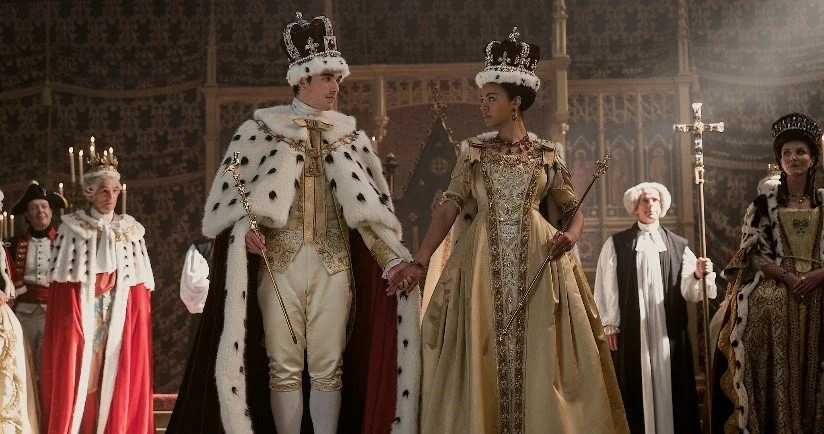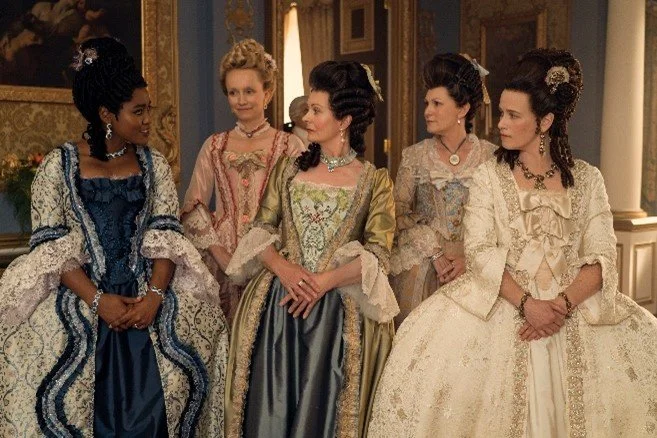Strong Dependent Women: The Feminist Readings of 'Queen Charlotte: A Bridgerton Story'
By Maya Thompson
Bridgerton’s newest instalment, Queen Charlotte, surprised me in more ways than one. A few months ago, as I was curled up on my bed engrossed in the season’s finale flickering on my laptop screen, I caught myself thinking about how I could make sense of the show in an article.
But where should we begin? Perhaps with a reminder that Bridgerton Season 1 and Season 2 are both, according to Cosmopolitan, in the top 5 of Netflix’s “most watched series of all time.” Why, I hear you ask? Besides the opulence of the costume and set designs, the actors’ good looks, and the sometimes clever, sometimes doubtful plot revelations, the main attraction seems to be only one thing: sex. And quite a lot of it. This, I feel, should be understood alongside the fact that most of the series’ episodes and major plot points are centred around women, their desires, and their misfortunes; this is no less prevalent in Queen Charlotte. Loosely inspired by the actual Queen Charlotte who ruled over Great Britain in the late 18th century, the latest Bridgerton series about a newly wedded young queen uncovering and securing her role in English high society as well as in her marriage with King George. On many occasions, the show offers a staunchly progressive take on both real-life and fictional events, so much so that it appears to completely remove itself from any goal of historical accuracy. This overt rewriting of the past has piqued my interest: perhaps Queen Charlotte is representative of larger political and cultural debates about which elements of history we choose to remember and collectively identify with? Thus, without further ado, let’s delve into a feminist analysis of the glorious pseudo-progressive chaos that is Bridgerton.
First, I need to establish that a single feminist critique of the series is not possible. The breadth and depth of feminist theories across the academic fields of Cinema and Film Studies and beyond are enough to suggest that contrasting and/or conflicting analyses are widespread and unavoidable. One cannot simply ‘take the feminist stance’ because that stance does not exist. There are neoliberal feminists, psychoanalytical feminists, postcolonial feminists, and so on and so forth. With that in mind, this article proposes a dual reading of Queen Charlotte which highlights two of the many possible approaches.
The first angle is more praising in that it points out what this season of Bridgerton does well, or at least what I believe it does well. Rather than a historical commentary of any kind, Queen Charlotte can be read as an honest attempt at highlighting women’s issues within our contemporary society. In addition to its focus on the life of a female monarch, the season also spotlights a plethora of female secondary characters. Different issues are often attributed to different characters. However, a united plight does emerge: one of affirming their identities in a world dominated by men. The historical setting allows the show to remind us of the constraints constantly faced by women: they have no ownership of their land and home, they often do not choose whom they marry, and so on. However, the women are shown to be able to use this patriarchal system to their advantage. In fact, the world which Queen Charlotte constructs could be labelled as ‘historical idealism’: the season reimagines a past society and creates a newly idealized space in which attitudes towards women, as well as towards people of different ethnicities and sexualities, can be reshaped. It is possible for Lady Agatha Danbury to rise within the royal court after the death of her husband, it is possible for Lady Violet Bridgerton to discuss her sexuality openly with her friend, and it is possible for Queen Charlotte to have as much influence on royal business as her husband. This ‘historical idealism’ allows for the exploration of contemporary issues, most notably the question of mental health and, specifically, the mental health of men. I was surprised at how the show approached this theme with a singular sincerity and openness: not only is Queen Charlotte portrayed as capable of aiding her husband (not because she must, but because she can), King George is also shown as fallible, as allowed to show moments of weakness and fear even as a king. The scenes of emotional intimacy between the two characters are, in my eyes, some of the show’s most poignant and potent moments: they offer a more balanced conception of marriage and love as a team effort and a shared responsibility which resonates with current social considerations; they allow a woman to take on a leading position without having to leave her husband or go against him. If an idealized feminist reimagining of history is the setting which allows for a beautiful story of dedication and forgiveness to unfold, then perhaps we can and should be more indulgent with the fantasies that Queen Charlotte proposes.
There is a flip side to this interpretation, however. The notion of ‘historical idealism’ can only be applied so far and has its limitations. Although the world is built in a fantastical manner, the show seems to abide by certain tropes which undermine its subversive social commentary. The women in the show are able to reach the areas of influence they do because of the men in their lives and are almost always thankful or indebted to them in some way. In this sense, the freedom and agency they hold is only contextual: they are the limited few who were able to make the most of the privileged situations they found themselves in. If their marriages and inheritances were stripped away from them, it would be impossible for them to forge their destinies in the way they have. What, then, is the value of Queen Charlotte as a feminist critique? If the fates of women are not universal and not truly in their control, is the show really as progressive as it is attempting to be? I believe the answer lies somewhere between the show’s rocky venture into the re-actualization of the past and the larger industrial pressures in the form of Hollywood norms and conventions. Although there are many elements that Bridgerton and Queen Charlotte can be praised for, most notably their commitment to bringing women’s issues to light, the scope of the series’ objectives is constrained: its reinventions are superficial and lie more in the realm of embellishment than they do in true social change.
I could finish this article here and conclude that there is still a long way to go until mainstream media productions consider flipping social orders on their heads to fully reimagine and reconstruct the world we live in. But can I really entrust this responsibility to Bridgerton and Queen Charlotte? Isn’t the mere glimpse into a more positive reality and historical ideal already something to be appreciative of? There are pitfalls to film criticism, and one of them is seeing negativity and lack in all aspects of culture. When I look back on my expectations for Queen Charlotte, I must admit that the show challenged them in a pleasant way and floored me with its emotional depth. The conclusion I come to, then, is that feminist approaches may find solace and meaning in noticing the worth of shows like Queen Charlotte and in turn, perhaps, being content with what is good enough for the time being.
Sources:
https://www.cosmopolitan.com/uk/entertainment/g42176068/netflix-most-watched/
ST.ART does not own the rights to any images used in this article.


